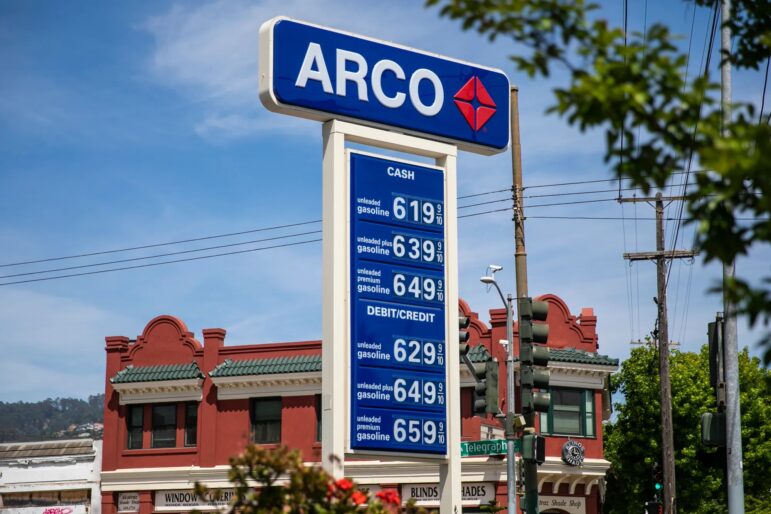For six months, Gov. Gavin Newsom waged a highly public battle against the oil industry, accusing companies of fleecing Californians as gasoline prices soared to record levels last year and urging lawmakers to claw back the excess profits to return to taxpayers.
Today, he finally got to take a victory lap, as he signed a first-in-the-nation law that could lead to a cap on earnings for oil refiners.
“We proved we can actually beat Big Oil,” Newsom said during a ceremony under the state Capitol rotunda.
But the measure Newsom signed is still a far cry from what he initially suggested in the fall, reflecting the political perils inherent in taking on an industry that may be a major villain for liberals but also provides a product used daily by millions of Californians.
Nor is this particular showdown likely over.
A representative for the oil industry, which fiercely fought the governor’s efforts, said refiners who operate in the state will closely monitor the development of regulations under the law and whether the Legislature pursues additional bills to address their lingering concerns before deciding whether to mount a legal challenge.
“Then we’ll have a better sense of, will this work, and do we need to step in?” said Kevin Slagle, a spokesperson for the Western States Petroleum Association.

Newsom set off a frenzy at the end of September, as the average price of gas at the pump surged past $6 past per gallon, when he called for a windfall tax on oil company profits, an idea favored by progressives that has never gained traction at the Capitol. Within a week, he announced that he would open a special legislative session later in the year to push for the proposal, using a penalty on excess profits to fund a rebate for taxpayers.
At issue were California’s retail gasoline prices, which are not only expensive, but far more expensive than the rest of the country — by last fall, the gap had grown to more than $2.60 per gallon higher than the national average, an ignominious record.
The oil industry says this is caused by greater taxes and regulations in the state, but Newsom argued that greedy companies were taking advantage of global shortages.
Though many legislators agreed with the governor’s assessment that taxes and regulations alone could not explain the steep prices their constituents were paying, his initial plan — to set a cap on refiner profits and fine those who exceeded the threshold — stalled for months at the Capitol without action. Even Democratic allies feared that, without more information, they might unintentionally create a disincentive for gasoline production, further constraining supply and leading to even higher costs for drivers.
The compromise, unveiled less than two weeks ago, shifts the process to state regulators. Oil refiners will be required to report additional data about their operations and a new watchdog division of the California Energy Commission will investigate alleged price gouging by the industry. That could inform the commission to establish a profit threshold above which companies would be assessed a financial penalty, though the rule-making process is merely authorized by the new law, not mandated.
Legislative Democrats raced over the past week to pass the proposal before they leave town at the end of the month for their spring recess, earning howls of disapproval from the oil industry and Republican lawmakers, who argued that the rushed timeline did not allow them to fully vet potential unintended consequences of the bill. Because it was passed through a special session, which the Legislature closed on Monday after a final vote in the Assembly, the law takes effect in 90 days.
Slagle of the Western States Petroleum Association said oil refiners take issue with the amount of data they will be required to report, the lack of privacy safeguards for that sensitive information and a provision of the bill that they contend would allow the state to interfere with their maintenance schedules.
If those points are not resolved in follow-up legislation, Slagle said the industry could potentially sue over the law. An unfavorable profit cap rule developed by the California Energy Commission would also be ripe for a legal challenge.
“We’re concerned about how that all turns out,” Slagle said. But, he added, with this heavily politicized clash at the Capitol now over, “We’re hopeful that we can shift to having a conversation about the real issue here, which is the supply of fuels.”
